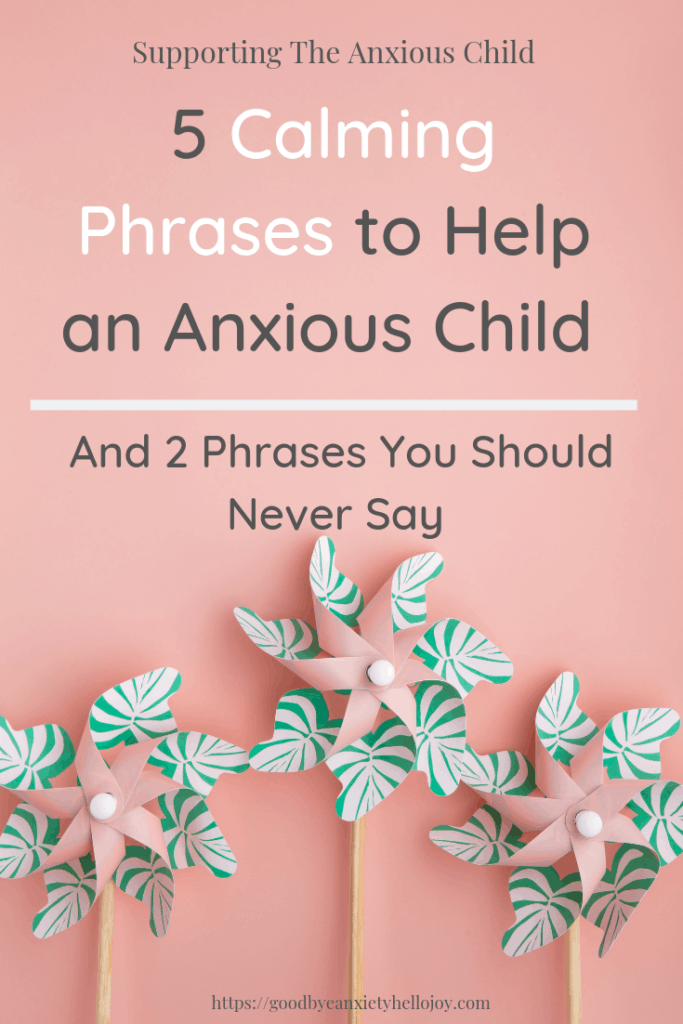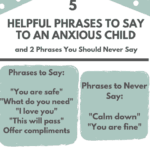
5 Calming Phrases to Help an Anxious Child
and 2 Phrases You Should Never Say
Have you ever been upset when a friend, partner, or co-worker turns to you and says, “Calm Down. Everything will be fine.”? If you are like me, your negative feelings are now at an even higher level than before the well-intended comment. Now imagine how you would have felt is the same response would have been, “I am sorry you are feeling that way. Is there anything I can do for you”? Suddenly, your negative feelings are lowered with the realization that you have support close by. These calming phrases to help an anxious child provide the needed comfort to reduce anxiety in kids.
Phrases to Never Say to an Anxious Child
“Calm Down”
When telling a child to calm down, you are implying that they have quick and easy control over their feelings and emotions. No child would choose to feel anxious and out of control…he or she is trying to “calm down” but they are past the rational stage that would allow them the ability to simply calm down. This phrase adds frustration to an already stressful moment.
“You are fine”
No, they are not fine. They are feeling scared and out of control. As parents, we know “they are fine” meaning that their current reaction is caused by anxiety rather than some true life-threatening situation, but they are not “fine”. They are suffering.
Calming Phrases to Help an Anxious Child :
“You are safe”
Reminding children that their feelings are real but that they are not in any danger reassures them that they are safe. Remind them that you are there to take care of them and keep them safe
“What do you need”
Asking a child what they need empowers them to ask for anything that will assist them in working through the anxiety. Each child is different and has different tools and techniques for working through an anxious moment. It is important to remember that each anxiety attack may also call for different tools to assist.
“I love you”
Simply reminding a child that you love them when they are at their worst can lessen the burden they are feeling. Often children with anxiety lack confidence in themselves and feel guilty about how their anxiety is affecting those around them
“I know this feels bad now, but it will pass”
This statement shows the child that you acknowledge how they are feeling rather than dismissing it. It also reminds them that the anxious feeling with not go on forever.
Compliments on what they are doing well to help calm their anxiety.
For example, “you are doing a great job at slowing your breathing” or “going for a walk was a great idea”. The positive compliments show that you see the hard work your child is putting into managing their anxiety. Compliments help empower your child and build their confidence.

(This printable is available to you in the freebie library for subscribers. If you have not subscribed, be sure to sign up at the end of this post for access to all of my free printables at any time.)
Other Things to Keep in Mind
In addition to calming phrases, children and teens can use mindfulness, stress relief tools, and books to help calm their mind and body during times of heightened anxiety. Once you have expressed your verbal support to your child, you may encourage him or her to find a calming activity to enjoy for a short period of time before returning to the task or event that may have been the trigger for the heightened anxiety. These ideas can also be “pre-planned” meaning they are accessible at all times, allowing children and teens the opportunity to have the needed materials on hand for when their anxiety arises. You may want to keep needed materials in the car, a visible location, within the home, at a caregivers house, or at school.
Phrases to help an anxious child can be used for typical anxiety or more severe anxiety. If you notice that your child’s anxiety/worries are happening more frequently than typical, more intense than their peers, or involve fears that are not common for your child’s age, you may want to seek guidance from a medical professional or therapist. Anxiety, with or without the label of a disorder, is treatable. It is important that you as the parent are aware of your word choice and attitude towards your child’s anxieties in order to perpetuate that whatever your child is feeling is supported but it is not something scary or dangerous.
Watching your child suffer is the most helpless, awful feeling in the world. We cannot “fix” our child’s anxiety no matter how hard we try. We can only do our best in each moment. When these moments arise frequently, it becomes difficult to say the “right thing”. Focus on the calming phrases to help an anxious child. Be kind to yourself and do your best, knowing you will get it “wrong” at times. Apologize to your child if you feel the need, be kind to yourself, and move on.
Great and helpful article but I must respectfully disagree with the line … anxiety is easily treated. It is not for everyone. We deal with this a lot in our family and have had to had somatic therapy, regular therapy, supplements and other interventions. I also taught several students with OCD and children on the spectrum with severe anxiety and it was brutal for them. It is not always a simple fix.
I very much appreciate your feedback. I went back and read the article where the sentence included “is very treatable”. I should have been more mindful in noting that anixety “is very treatable” in many people but for others, it can be very difficult to treat. I have lived through a hellish 13 years with my daughter’s anxiety. Treatment has been very beneficial but it is not in any way “cured”. I have gone back to the article and removed the word “very”.
Very true
I keep this where I can see it often. As much as I use these phrases with my children, I have to remember to say them to myself as well. I hear the kids saying the helpful phrases to friends and siblings/cousins, so I know they are building resilience skills for a strong future.
I also have to remind myself to say these phrases. The more often they are used, the more instinctive they become but it is hard not to quickly say, calm down! It is wonderful to hear children learning how to talk with other children!
My son is an anxious child and I always say these things to him. I think it’s important to convey that you understand and will be there for them. Living with anxiety myself I cannot imagine telling someone they are fine or to calm down while they are anxious. That never helps and only causes more anxiety! Thank you for sharing!
So very true. Even though I am anxious and I have been through so much with my daughter, I catch myself saying to calm down…it just slips out so quickly. I always correct my wording when that happens. I have yet to meet an anxious person who hears “calm down” and is able to turn off the anxiety.
I live this list. My oldest is an extremely anxious child and we have had to incorporate a lot of these phrases and strategies into our lives. They also help with our youngest who is not as anxious!
The right words truly make a difference in handling anxiety…and emotions in general.
I don’t have kids, let alone anxious ones, but I was an anxious child. I grew up hearing “Stop it” and “You’re fine.”
These are great tips and I wish my parents had tried to learn a bit more about anxiety when I was growing up.
I heard “calm down” all of the time and I remember being angry that I couldn’t just calm down. I felt like something was wrong with me when I couldn’t do what was asked of me.
These are great, I have been trying to think of different ways to calm down my two year old when she throws her temper tantrums. I will be giving these a try soon for sure.
These are great, I have been trying to think of different ways to calm down my two year old when she throws her temper tantrums. I will be giving these a try soon.
This is so true. I am a mom with severe anxiety. My six year old has anxiety and my five year old severe autism. I try to never utter the words “you’re fine”. I may whisper “you’re going to be fine, but I know it’s hard right now”, but never just you’re fine.